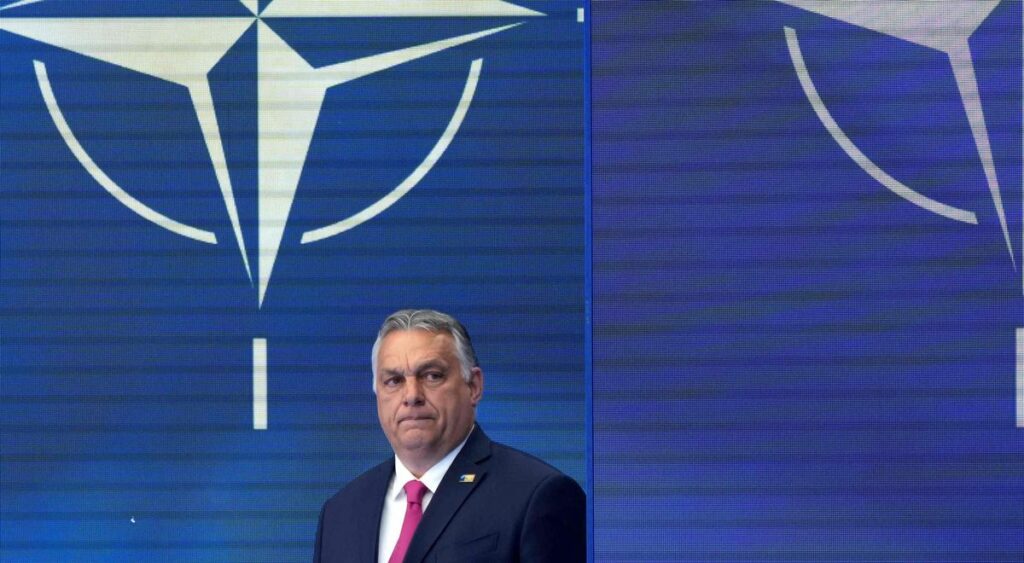BRUSSELS BEHIND THE SCENES
Weekly analysis and untold stories
With SAM MORGAN
Don't count your NATO chickens
Finland and Sweden’s bids to join NATO have very nearly been ratified by the military alliance’s members. But problematic hurdles lie in wait, one of which is a supposed EU ally.
After Spain completed its ratification process of Finland and Sweden’s NATO membership applications—required from all 30 of the alliance’s members—just Hungary, Slovakia and Turkey are left on the to-do list.
Slovakia is facing internal political chaos, which helps explain its lack of urgency in getting the ratification off its docket, leaving just Ankara and Budapest as the last remaining bumps in the road.
Turkey was initially thought to be the most difficult sell, given its complex relationship with Russia and distaste for some of Sweden’s counterterrorism policies, in particular. But it is rapidly looking more and more like Hungary will once again be the fly in the ointment.
BRUSSELS BEHIND THE SCENES is a weekly newsletter which brings the untold stories about the characters driving the policies affecting our lives. Analysis not found anywhere else, Sam Morgan helps you make sense of what is happening in Brussels. If you want to receive Brussels behind the scenes straight to your inbox every week, subscribe to the newsletter here.
President Recep Tayyip Erdogan’s government was quick to air its misgivings about Finland and Sweden’s bids to join NATO, demanding concessions on issues in Turkey’s national interest in return for its approval.
That process is ongoing but it is happening within a structured framework. Ministers and government delegates are meeting to hash out compromises and rule changes, with Finland’s ambassador insisting the talks will be done well before Christmas.
Optimists then could argue that Turkey will drop its veto threat sooner rather than later, after getting what it wants out of the negotiations, stretching patience to the absolute limit as per usual.
That leaves Hungary as the only country left to give its nod of approval. Although government officials have stated that there are no objections to the NATO enlargement push, those assurances must be taken with a massive pinch of salt.
Earlier this week, it was reported that Prime Minister Viktor Orban had told his Fidesz party that the EU’s sanctions on Russia should be withdrawn, just at a point when Brussels is sounding out national capitals about a fresh round of punitive measures.
Orban’s government has now announced another ‘national consultation’ to ask voters what they think of the Russian sanctions, insisting that "it's not fair that the Brussels elite decided on them alone."
It is not the first national poll of this nature, designed to give Orban a mandate to go and stir the pot in EU-land. Previous editions have included questions that blame George Soros for Hungary’s problems.
A cursory glance at Viktor Orban’s political playbook can only lead to one conclusion: he will use the outcome of this consultation to lobby overtly for the sanctions to be scrapped and will threaten to torpedo the NATO bids if his wishes are not granted.
In the best-case scenario, the threat will be short-lived and Orban will make do with yet another watered-down sanctions regime. The EU will probably throw in funding that is currently on ice just to sweeten the deal.
But if EU leaders call his bluff, insist on extra sanctions to weaken Russia at a crucial point in Ukraine’s defence of their internationally-recognised borders and finally put Orban firmly in his place, Finland and Sweden could be in for a long wait.
It is easy to predict how that would be perceived both in Moscow and in other parts of the world. NATO and also the EU would be ridiculed for being a divided house, possibly boosting Putin’s belief that his military can meet all of its objectives in Ukraine.
Not that this crumbling of Europe’s united front matters much in Budapest. Orban’s government has already lobbied for weak energy sanctions and seen fit to let its foreign minister meet with Putin henchman Sergey Lavrov earlier this week.
The crucial question is: what can the EU and NATO do about it? The answer is: not much.
At a council summit this week, ministers dismissed the idea that any meaningful discussion could be had this year on scrapping national vetoes over certain policy areas like foreign affairs and tax matters.
Ursula von der Leyen had reinvigorated that debate during her State of the Union address but it has quickly been injected with a predictable dose of disappointing reality by member states, who are of course not going to vote in favour of what they see as losing influence.
That means that countries like Hungary, which MEPs have branded as a ‘hybrid regime of electoral autocracy’, will continue to disrupt EU-level decisions, as the concept of doing what is right for all or protecting the common good is no longer standard practice.
Viktor Orban is likely to win another ally on Sunday as Italians go to the ballot boxes, with polls predicting a comfortable victory for the far-right. Giorgia Meloni, the likely next PM, will be a relatively powerful accomplice for Hungary’s shenanigans.
Thankfully, in that case at least, Italians will probably ditch Meloni at the first possible opportunity once her Fratelli d’Italia party becomes tainted by lack of accomplishments and the economic fallout from replacing Mario Draghi with a far-right coalition.
Patience is not an infinite commodity and one wonders how long the collective-EU’s will last with Orban’s Hungary. And what will happen when it indeed runs out.
BRUSSELS BEHIND THE SCENES is a weekly newsletter which brings the untold stories about the characters driving the policies affecting our lives. Analysis not found anywhere else, Sam Morgan helps you make sense of what is happening in Brussels. If you want to receive Brussels behind the scenes straight to your inbox every week, subscribe to the newsletter here.

